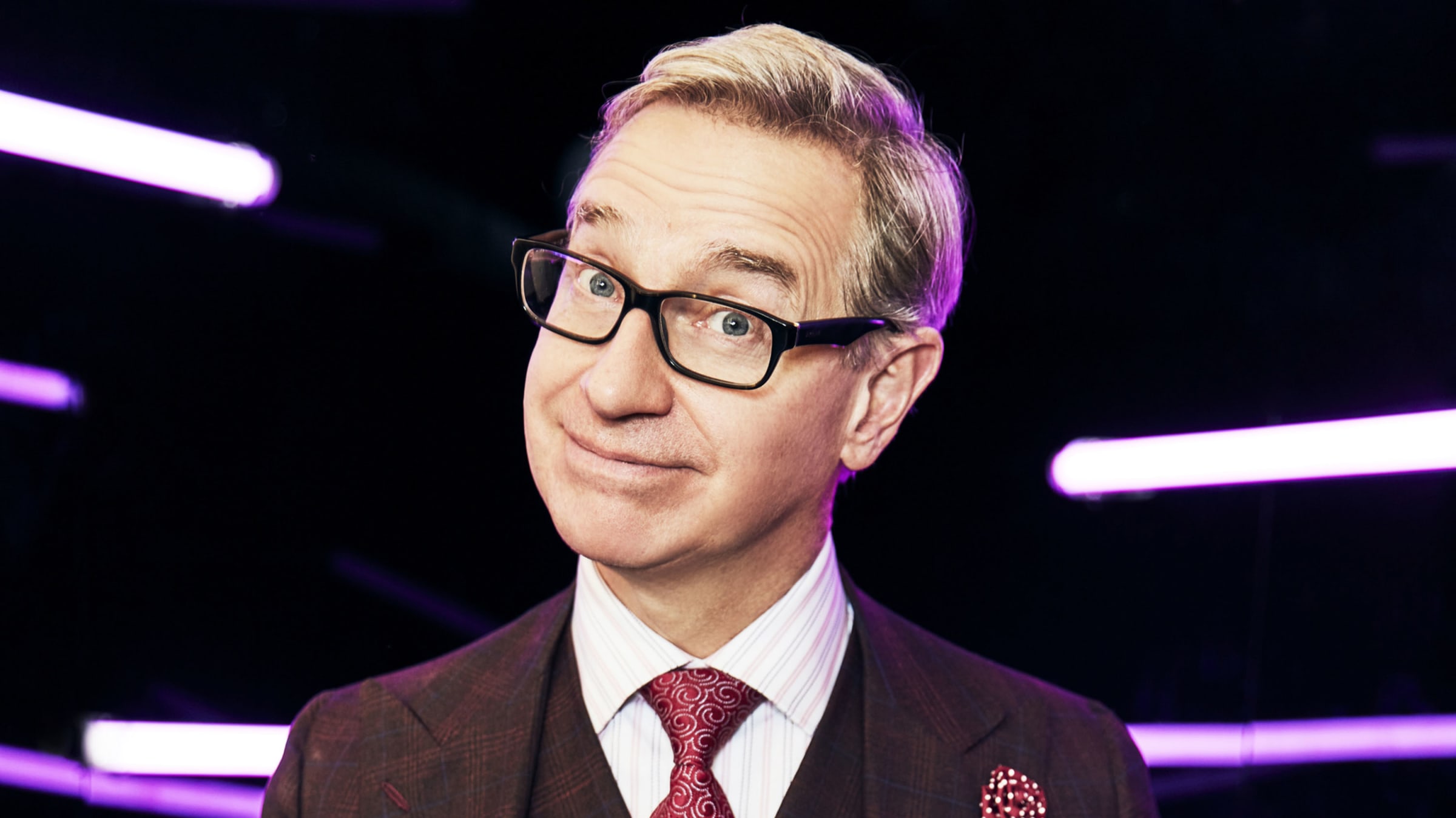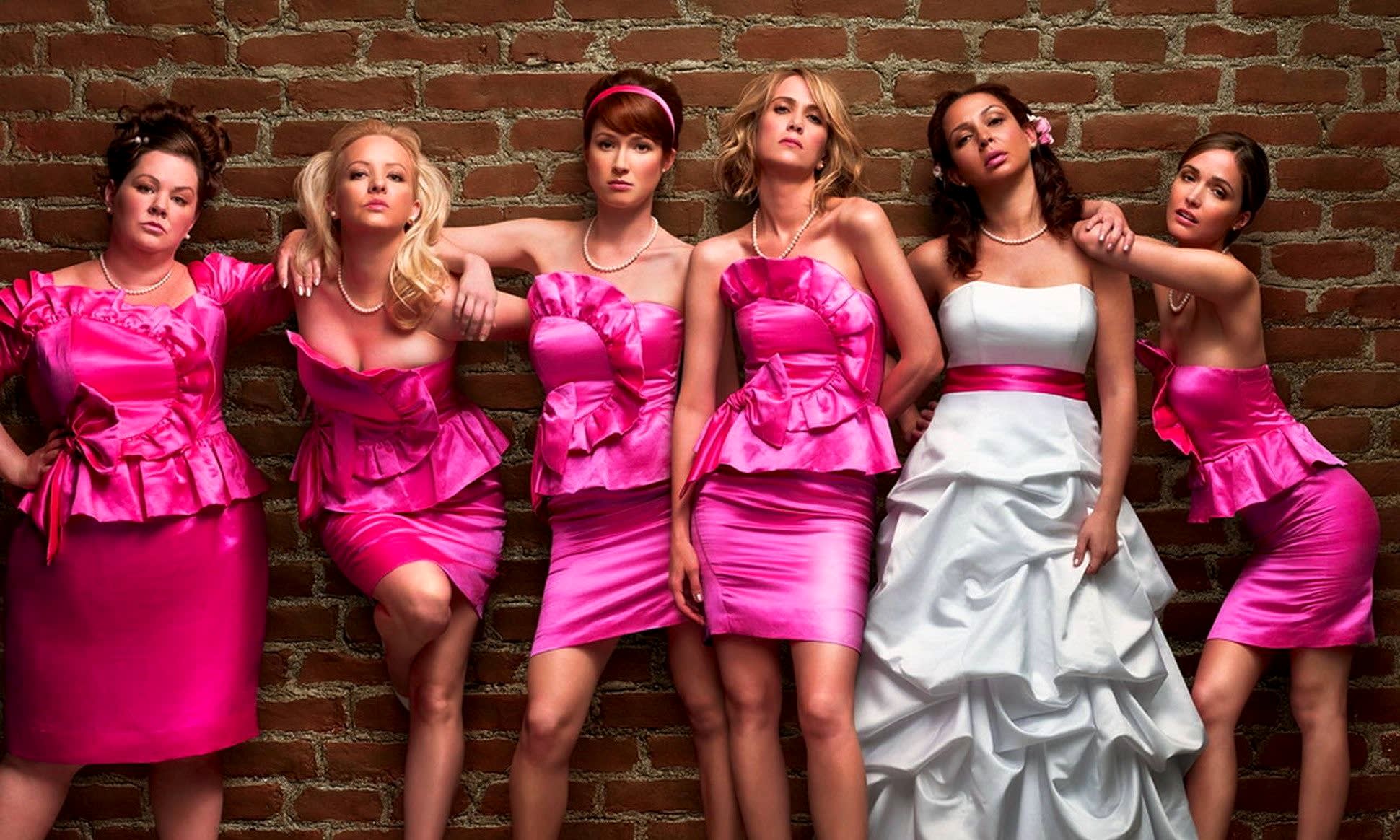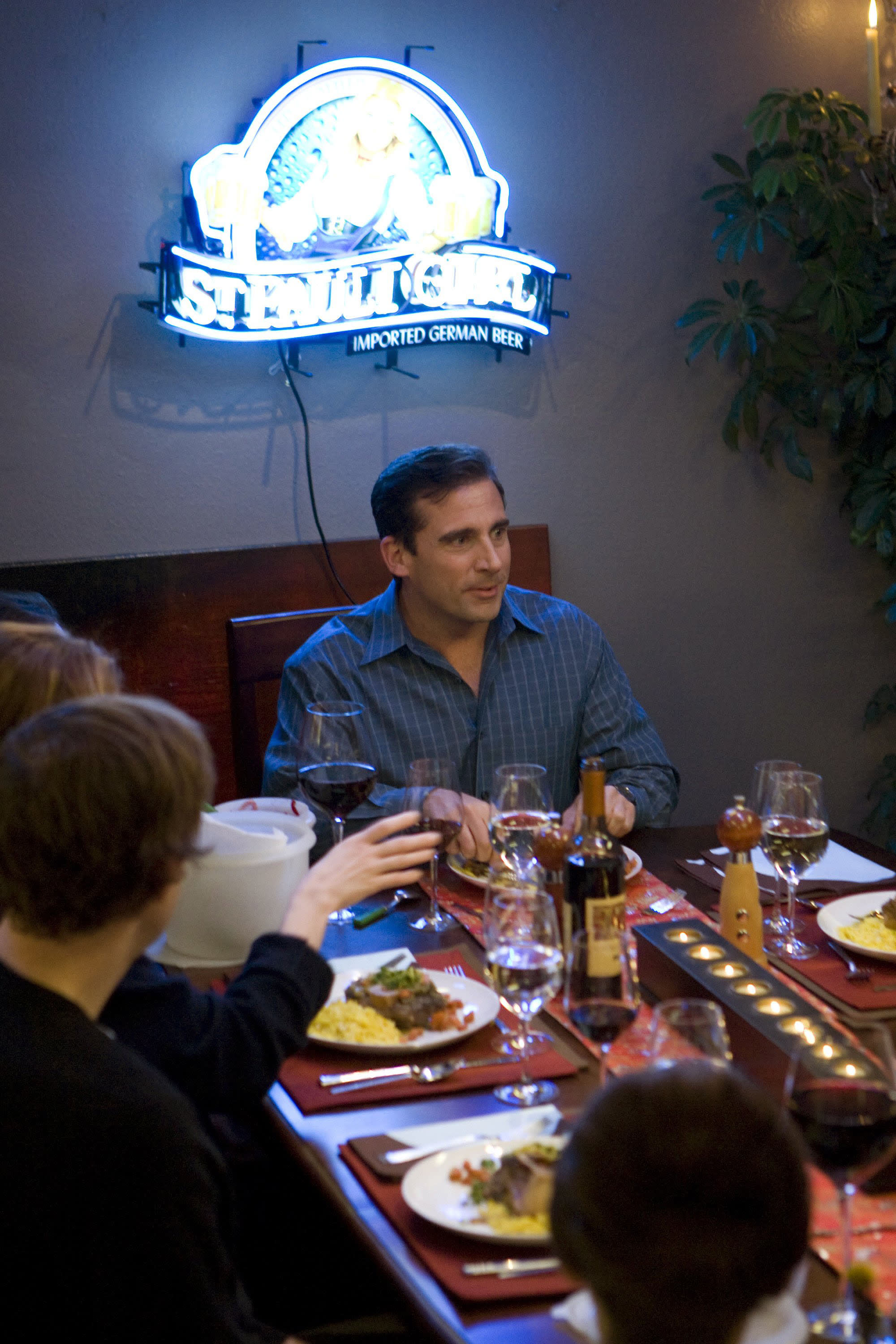Paul Feig on Hollywood Sexism, Trump’s War on ‘Ghostbusters,’ and a ‘Spy’ Sequel

Maarten de Boer/NBCUniversal/NBCU Photo Bank via Getty
The “Bridesmaids” director and “Freaks and Geeks” creator opens up to Marlow Stern about empowering minority voices, far-right smear campaigns, and the return of “Other Space.”
Paul Feig will not let a once-in-a-century pandemic slow him down. He’s balancing far too many plates. There’s a feature in pre-production that he’s planning to direct—an adaptation of the bestselling novel The School for Good and Evil, a potential Harry Potter-esque franchise—as well as This Country, a U.S. remake of the famed U.K. mockumentary about rural life at the margins. Or how about the projects he’s shepherding through his production company, Powderkeg, like the Issa Rae-starring Netflix film American Princess, Eva Longoria’s directorial debut 24-7, and East of La Brea, a Los Angeles-set TV show centered on two young Muslim-American women. So Feig, 57, is holed up in his office in Burbank, California, typing away.
“The entire building is completely empty, so I figure it’s probably the safest place in the world!” he says with a chuckle.
While his sometime collaborator Judd Apatow has received most of the ink, Feig’s had a hand in some of the finest comedy of the past two decades. He created Freaks and Geeks, which was inspired by his high school experiences; helmed some of the best episodes of Arrested Development and The Office; directed the groundbreaking comedy Bridesmaids; and followed that up with The Heat, Spy, Ghostbusters, A Simple Favor, and Last Christmas.
In the midst of all that, he also created Other Space, a short-lived sci-fi comedy series about a young, diverse, wildly dysfunctional crew whose ship is stranded somewhere in outer space. Starring Karan Soni (Deadpool), the show was canceled after a single 8-episode season, owing to its platform Yahoo! Screen shutting down. But fear not! You can now view the show in its entirety over at DUST, beginning in August.
The Daily Beast spoke with Feig about creating opportunities for women and people of color, the right-wing campaign (led by Trump) against his all-female Ghostbusters, directing the finest episode of The Office, and how Bridesmaids changed comedy.
These are surreal times. When do you think the film industry will be back up and running now that California is shutting down again?
I have no idea. Every day I’ve gotten some calls about this trying to figure it out, because we have two shows that have been picked up, a movie, and a pilot. There’s just no way to know, really. Our country has screwed things up so badly. And I’m worried about the U.K., because there’s this movie for Netflix I’m supposed to do that’s set to shoot in London, and they’re doing OK right now but I don’t see a lot of masks out there. I get very worried when everyone gets so cavalier and pretends this thing isn’t happening.
The mask thing is so bizarre—that wearing one in the middle of a pandemic has become politicized, and reframed as this “masculinity” thing.
Oh, totally. The fact that it’s been made into a political statement shows just how screwed-up we currently are right now. It’s maddening.
I’ve grown up with your work. One of the earliest films of yours I remember seeing is Heavyweights, which was a cherished film among my friend group as youngsters. It features one of the more underrated/unhinged Ben Stiller turns, in my opinion.
Yeah! It was a very fun time. We were all holed up in North Carolina—Hendersonville and Asheville—and we just had a blast, and tons of laughs. The kids were so much fun. Kenan Thompson? Forget about it. He was as funny back then as he is now. When it came out it really didn’t do well, so we were bummed out that it wasn’t considered a success by any stretch. It’s funny that, all these years later, it’s found such a following—and in ways I’m very surprised with.
The post-credits sequence of Heavyweights features Ben Stiller selling healing crystals door-to-door. You guys were way ahead of the curve in the ‘healing crystals’ department, given that it’s now all the rage in Hollywood.
We were prophets in so many different ways on that film!
Going back even further—when did you realize you were funny, and when did you realize you could be funny for a living?
For me, it was really early. Probably when I was five years old, I decided I wanted to do comedy for a living. When I was in kindergarten, I played the lead elf in the school play, and my parents put me in this ridiculous costume that was all cobbled together out of stuff from my Dad’s army-surplus store. The minute I walked out on stage the audience went crazy with laughter, and not knowing they were laughing at me I just remember being completely hooked on the idea that you could make people laugh like that. That’s the moment where I realized, “I want to be in comedy. That’s all I care about. Whatever I can do to get this kind of response out of an audience, I will do.”
I’m curious too what it was like being raised in Christian Science, and do you still practice it?
I don’t, no. But it was interesting. My grandmothers were very hardcore into it. I dropped out of it at 18 or 19, because I really got into science. I remember my Mom telling me, “You’re going to have a really hard time balancing the two things…but I support whatever you want to do.” There were good things that came out of Christian Science for me, including the idea of not running to the medicine cabinet anytime something bad happens—though obviously I go to doctors now and do whatever I have to do to stay healthy—but it got me out of that headspace of, “I need to just go take aspirin.” But no, I don’t practice it anymore. It’s been a long time.
So Other Space is finally back on DUST for people’s viewing pleasure. And I really enjoyed the show. One of the things I loved most about it is that pace is rapid-fire—it doesn’t let up for a second, almost like an Iannucci show. And also, how diverse the cast is.
This was five years ago, and we were in pre-production on Spy in Budapest when I got contacted by Yahoo!, and they wanted to do this thing called Yahoo! Screen where they would fund three different TV ideas with real budgets. I had written Other Space back in 2005, when I had a deal with NBC in the wake of Freaks and Geeks, so I wrote this because I’ve always been a sci-fi fanatic and always wanted to do a sci-fi comedy. They really liked it but just didn’t know what to do with it, so it went away. I carried that script around for nine years and every time someone asked me, I was like, that’s the one that got away. So when they called, I was like, I’ve got something that I’m dying to do. They loved it, and so we did it.
The first person I brought on was Owen Ellickson, who’s now one of the bigs handling Superstore, and Owen and I just completely hit it off from our first interview. We had the exact same sense of humor. So we assembled this great cast, and I remember when Karan Soni walked in, I was like, Oh my god, he’s the funniest guy I’ve ever seen. We just threw the door open wide—not caring about gender or what color you are or any of that—and that’s truly the way to get the best cast. We just got this supergroup of funny people about to take off, and Owen and the writers’ room were churning out great stuff. It was a breakneck pace—we only had three days per episode, and you’d usually have five days—so it was pretty intense.
On the topic of diversity, what do you think the responsibility should be for powerful white men in Hollywood like yourself when it comes to creating opportunities for women and people of color?
You have to do it. I always say, “If what’s on the screen doesn’t reflect what you see in the real world, you’ve failed.” Look, I look at some of my work and it’s not diverse enough, and I own that. I’ve worked so hard to help women that I’ve certainly fallen short in other kinds of diversity, and behind the camera too. I’ve been trying to remedy that over the last several years with my own projects and with the projects we create through my company, Powderkeg, that we formed strictly to empower women, people of color, and LGBT voices—really, anyone who’s underserved. Anyone who has a say in the ability to create opportunity, you have to do it. You’re not being a member of the world if you’re not creating opportunity. You should be wanting to empower little-heard voices, and allow them to be heard. I know my tone and I enjoy what I do but I’m also kind of tired of my voice, and there’s nothing more exciting than hearing a voice that is not only not yours but also representing a community or point-of-view that you haven’t been exposed to. It’s thrilling.
Through Powderkeg, we did this series that we’re still trying to get picked up called East of La Brea, and it was all written by Muslim-American women about the Muslim-American experience in Los Angeles. It was so exciting to see that come together, and to see those voices represented and these stories told in a way that I don’t tell stories, and through a perspective that I don’t know firsthand.

Universal Pictures
Prior to our interview, I was reading old reviews of Bridesmaids and they were pretty shocking. There was a lot of, “Wow, I didn’t know women could be this funny and raunchy too!” Was it difficult to get Bridesmaids developed given the male-centric atmosphere in Hollywood, and certainly in comedy, at the time?
I actually put Kristen [Wiig] in her very first movie when I did this film Unaccompanied Minors, but it was a very small part. She’s so great, so when Judd [Apatow] did Knocked Up, he said to Kristen, “You should write your own movie because you’re so funny.” So she and Annie (Mumolo) wrote the first draft of what would become Bridesmaids, and I went to a reading of it back in 2007 and was so in love with the idea of having a vehicle with all kinds of funny women. But then it kind of languished for three years. It was hard because of Kristen’s schedule, since she was on SNL. It wasn’t an expensive movie, and the issue was more while we were making it, how the town suddenly attached so much importance for it needing to succeed. That’s the part that I found rather infuriating.
I know from female writers who are friends of mine, that they were pitching their projects in meetings and were constantly being told, “Well, we’ve got to wait and see how Bridesmaids does, and then we can talk about it.” Consider how backwards that is! That literally one movie with a mostly female cast is such an outrageously unheard-of thing that the whole town is going, well, we can’t do anything in that same direction until we see if it works. That never happens with a movie starring men. With The Hangover, Warner Bros. wasn’t going, well, let’s see if this movie starring three guys does well before we can green-light other movies about guys!
The amount of pressure on it during the making of it—and during post—was enormous, and even in the run-up to it coming out, our tracking was very bad. We were being told that if we didn’t make over $20 million opening weekend we would be considered a failure. We had a midnight screening the night before opening and it didn’t go very well, because it was a wedding movie on a Thursday night at midnight. So, the calls I got in the morning were that it’d make $13 million. I was despondent most of the day until we got to the evening, when the calls came in and the box office was going up and up and up. It turns out Melissa McCarthy and her husband Ben Falcone were having dinner at our house, and I got a call saying, “It’s looking more like $23 million,” so I said, “We’re getting in the car right now!” and we drove down to the ArcLight and watched this packed theater just rocking with laughter, and it was such a relief. But in the aftermath, we though, man, how unfair to put that much pressure on a movie.
You see a lot of female directors get one studio film and if it doesn’t go well, they immediately get thrown in movie jail.
Oh yeah. I think it’s something crazy, like men tend to have 1-2 years in between movies, and women tend to have 8-10 years between movies. It’s been so wrong for so long, and crazy that we’re only starting to course-correct it now.
I wanted to ask you about your all-female Ghostbusters, and the online backlash it received. It seemed to serve as a precursor of sorts to this new online hellscape during the Trump era, with far-right forces mobilizing against your film intent on destroying it—and harassing the people involved. And even Trump came out against the film.
Look, it was terrible. It was a terrible time. I’m so proud of the movie. Literally today is the fourth anniversary of its opening. It found its audience, and people really love it. I get inundated by people constantly who really love it. You still get the people though who write nasty stuff, and you’re like, man, it’s been four years—you’ve got to let it go. You’ve really got to let it go. The greatest moment that happened for me, after all that crap that was thrown at us, was we won the Kid’s Choice Award for Favorite Movie. We beat Captain America, Rogue One. Every time I comment on it someone brings up more shit. I love the film, I’d love to make another one, and we have a fan base—which is the most important thing.
It was really nice to see all the photos of young girls dressed as Ghostbusters for Halloween. And I’ll never for the life of me understand these men who take serious issue with these gender-flipped movies, and this bizarre notion that they’re somehow being “replaced.”
I always like to say, “I wish I could get inside your head,” but I don’t even want to be inside there. There are obviously some serious issues going on. I get the whole idea of being very, very fanatical about things you love. I’m a firm supporter of that. But I’m just not a believer in things becoming so untouchable or so canon that there isn’t room for a different version that doesn’t erase the previous version. If someone wants to take on something beloved and make another one, they should be able to do it. We’re just trying to make the best possible thing we can to entertain an audience, and people assign more evil instincts to some of these things.
I’d be remiss if I didn’t ask about the Ghostbusters reboot, and why your film didn’t get a sequel. It doesn’t seem very fair. And when we talk about the chances these studio films get that center women, and how they’re often only given one shot, that seems to have happened here.
It all comes down to money. If something makes a ton of money, there will be more. If something is on the edge of making money but not where they wanted it to be, maybe it gets picked up. If it doesn’t make enough money, it doesn’t get picked up for a sequel. There are more onerous reasons for why something on the bubble won’t get a sequel, and that’s worth exploring on a case-by-case basis. Hollywood is a very well-meaning town, but Hollywood is not a very altruistic town. So they’re not going to lose money, and we’re always trying to battle as filmmakers and say, “Look, you’ll get this return on your investment.” We’re all utterly convinced our films are going to be hits when we make them!
Spy was one of the better comedy films of the last five years. Are we getting a sequel?
When we came out, we did really well but I think we were one of those on-the-bubble films, where they were like, “It made money, but it didn’t make as much as we wanted.” I really wanted to do a sequel to that and had made a deal to write the script—but then Ghostbusters came along and that muddied the water a little bit. Now, the issue is that Disney bought Fox, so it’s technically a Disney property. I don’t want to make a Spy sequel that isn’t R-rated, because that’s part of the fun of that movie—to be outrageous with it, and realistic at the same time—and I don’t know if there’s any appetite at Disney to let us make an R-rated version. But that’s one movie sequel that I want to make, and that I know would stand up, and I know what the story would be that would be really funny. Melissa [McCarthy], we’ve talked about it a bunch of times. And I love Jason [Statham]. I think everyone would be on board for it. I love Spy. It’s one of the films that I’m the most proud of, because I got to do everything I wanted with that movie.

Steve Carell as Michael Scott in The Office episode "The Dinner Party."
Chris Haston/NBCU Photo Bank
I also love The Office. And you directed two of the very best episodes of The Office: “Dinner Party” and “Goodbye Toby.” Are you fascinated by how popular The Office has become? It’s one of the top streamers on Netflix.
I was around from day one on that because I knew Greg Daniels, and I was shooting a pilot around where he was and remember him calling me into the editing room to show me the different theme songs. He showed me the piano one and I was like, “I like that!” I came onboard at the beginning of the second season, which was the first full season. I watched the pilot where they just recreated the British pilot and remember thinking, “I don’t know if this is going to work.” But as I watched the episodes go along, I thought, “This is so funny, and they’re really making it their own.”
It became very comfortable. It’s a very comfortable show to watch—it’s comfort food. The characters are acting very real but they’re also very funny, and they’re extreme but they don’t feel over-the-top insane just to get you to laugh. It’s very, very funny, and you love these characters. And it was a joy to work on, because those actors were so great, and the style allowed us to shoot so much stuff at such a pace. It really paved the way for where comedy is right now. I still love turning on the old episodes—and I love watching some of mine.
What was your favorite part of “Dinner Party?” Steve Carell and Melora Hardin are just operating on another level in that episode. It’s outstanding to watch.
I was an executive producer on the show that season, and I had read that script and another director was supposed to do it, but I remember reading it thinking, “This is the funniest thing I’ve ever read, and I want to direct this.” And then the writers’ strike happened, and I got to direct it. That cast is so great that it was so much fun to put them in a cage and let them at it. But one of my favorite things was designing the look of that apartment, because one of the very first episodes I directed was where Michael bought his condo, and so going back, we knew we had to make it something where Jan had completely taken over. I had so much fun in prep just making sure what the apartment was supposed to look like—the big Andy Warhol mural of Jan on the stairs, the kimonos on the wall, the paint job, and obviously the plasma-screen TV. It’s one of my favorite gags I’ve ever shot, where we zoomed in on it and then we pull out and it’s this giant wall with this tiny TV on it. [Laughs] It was just so much fun to do because everybody was absolutely on fire. It’s a perfectly-written episode of television because you understand why everyone’s doing what they’re doing and it’s so uncomfortable.
